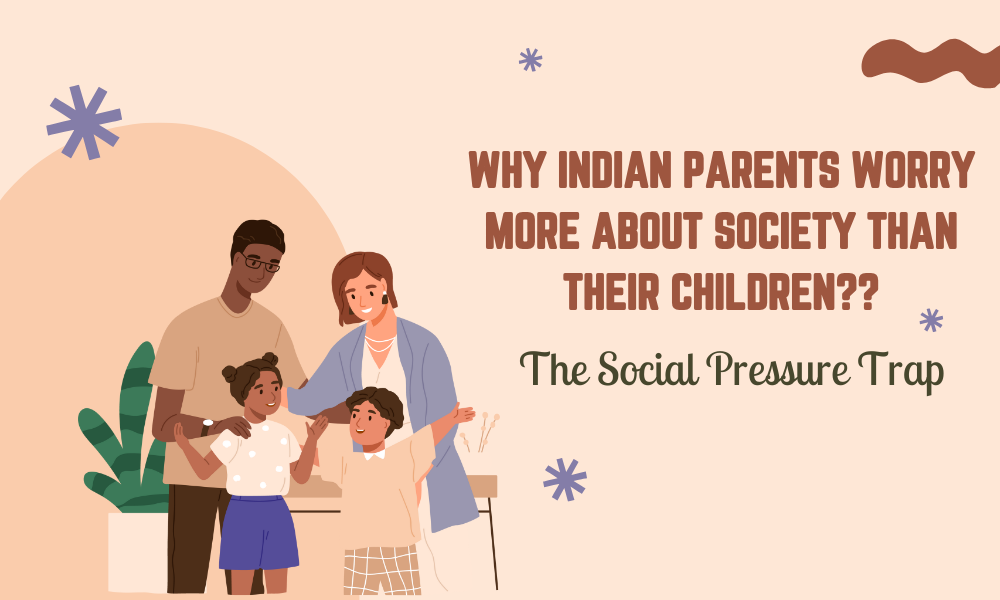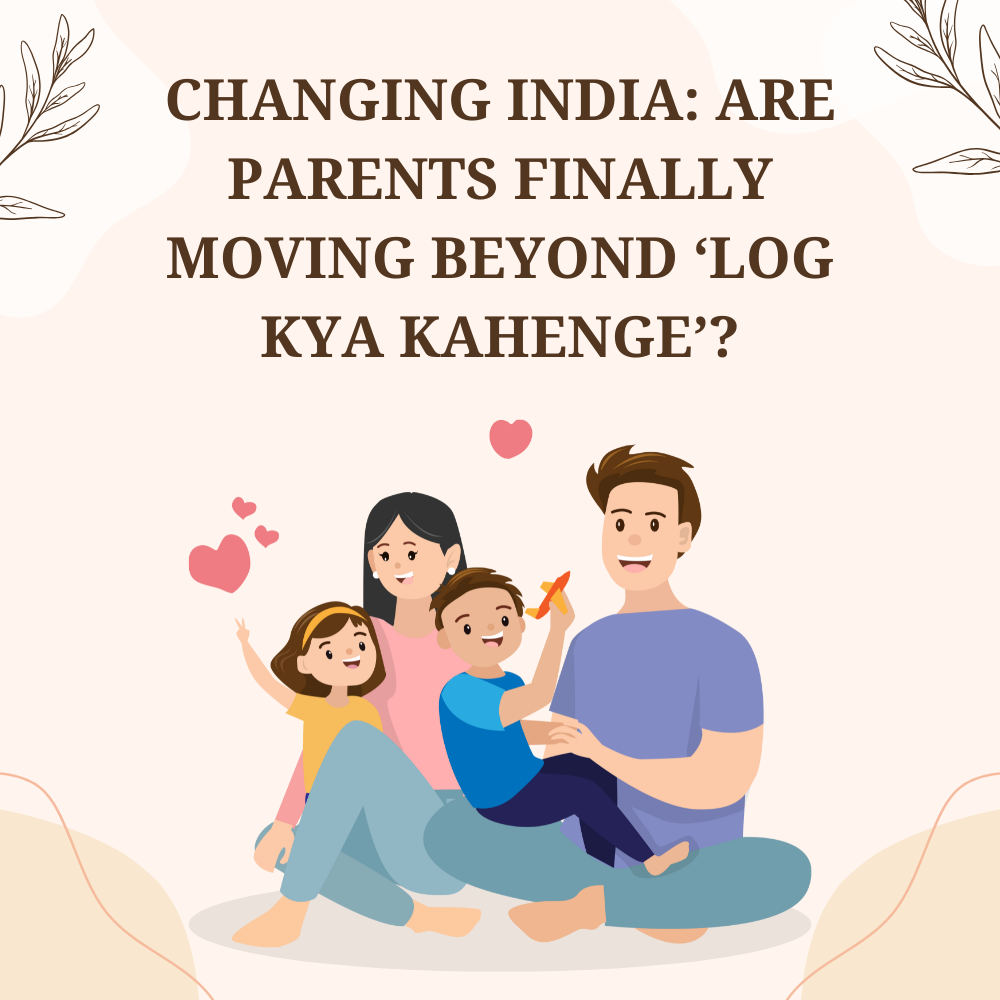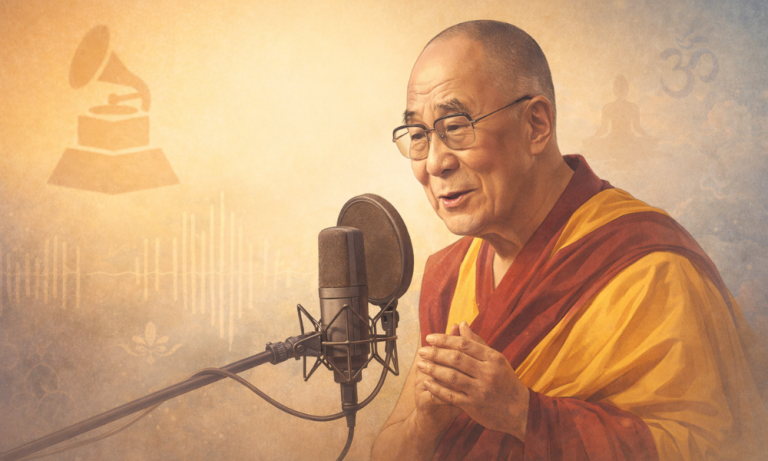The Social Pressure Trap: Why Indian Parents Worry More About Society Than Their Children
Introduction
Indian families may live in diverse cities, talk distinctive dialects, and have a place to diverse cultures but one express join together nearly each family: “Log kya kahenge?” (What will individuals say?)

This basic sentence has formed connections, careers, relational unions, and indeed the certainty of millions of children. Whereas Indian guardians truly cherish and care for their children, numerous still donate more significance to society’s endorsement than their child’s individual choices or joy. But why does this happen? Where does this mentality come from, and is it changing with time?
Let’s explore.
- The Profound Root of Social Picture in Indian Culture
India has continuously been a community-based society, not an individualistic one. In towns, towns, and indeed cities, individuals judge a family by how they raise their children. A child’s behaviour is seen as a reflection of the whole family’s values.
So, Indian guardians develop up thinking:
A child’s botches = family’s insult
A child’s accomplishments = family’s honor
For more seasoned eras, society’s regard was survival, since families required social back amid relational unions, celebrations, cash issues, and commerce. That mentality continued even when times changed.
- Notoriety Things More Than Explanation
An Indian family would or maybe fulfil the neighbour than get it their possess child.
Why?
Because in numerous families:
Reputation > Logic
Social Picture > Individual Desire
Tradition > Freedom
For example:
Choosing a diverse career: “Engineers and specialists bring regard. Who will regard an artist?”
Choosing an inter-caste or cherish marriage: “What will relatives think?”
Choosing to live alone or move overseas: “People will say the child is selfish.”
Parents fear feedback since society adores talk more than realities. And indeed, if the choice makes the child cheerful, guardians stress more around being judged.
- Childhood Conditioning: They Were Raised the Same Way
Most Indian guardians nowadays developed up in homes where their claim guardians constrained choices on them.
They were told:
“Girls from great families don’t talk loudly.”
“Boys shouldn’t cry.”
“Study this subject since it looks respectable.”
“Marry where we decide.”
So, when these guardians develop up, they apply the same mentality, believing:
“If it worked for us, it will work for our children.”
Breaking generational convictions is hard—especially when guardians never experienced flexibility themselves.
- Fear of Comparison
Comparison is a national side interest in India.
“Sharma ji ka beta IIT me hai.”
“Uske bete ka bundle itna hai.”
“Dekho, sab ki betiya shaadi kar rahi hai.”
Parents continually compare:
Salary
Marks
Looks
Marriage
House
Lifestyle
They stress that society will consider them “unsuccessful parents” if their child’s life looks distinctive from the conventional pattern.
So in step of asking,
“What makes my child happy?”
they ask,
“How do we see in front of others?”
- The Figment of a ‘Perfect Family’
Indian families are frequently active making an image:
Happy marriage
Obedient children
High marks
Good job
Big wedding
Big house
Even if there are battles interior the domestic, guardians need the world to accept everything is culminate. Since in India:
Issues are hidden
Picture is displayed
So, if a child chooses something unconventional like a inventive career, a late marriage, or living differently parents freeze since it debilitates the ‘perfect family image.’

- Enthusiastic Shakedown: “We Yielded Everything for You”
Indian guardians give up a lot financially and candidly. But now and then, they utilize this give up as enthusiastic control.
“We went through so much on your education.”
“We trusted you. Don’t break our respect.”
“If you select this way, society will giggle at us.”
The child is not fair burdened with desires, but with guilt.
Many children compromise their bliss since they are anxious of harming the guardians who cherish them.
- Society Has More Control Than Logic
In India, choices are not judged on whether they are right or wrong—they are judged on what individuals will say.
Examples:
A girl needs to remain single: “Log bolenge ladki mein issue hai.”
A child needs to stopped a work: “Log kahenge futile hai.”
Someone needs a separate: “Log bolenge family failed.”
A child chooses a diverse religion or accomplice: “Log kya sochenge?”
Even if the child is despondent, guardians feel they can endure it—but they cannot endure social embarrassment.
- But Things Are Changing Fast
Not all guardians think this way now.
Modern guardians are:
✔ Letting children select careers
✔ Supporting cherish marriages
✔ Empowering entrepreneurship
✔ Tolerating mental wellbeing issues
✔ Letting girls travel or live alone
✔ Supporting LGBTQ+ children
Young, taught guardians esteem enthusiastic joy more than society’s talk. In cities, suppositions are moving. Numerous guardians gladly say:
“My child’s life, my child’s choice.”
“Society doesn’t pay our bills.”
“Happiness is more vital than tradition.”
Change is happening slowly but it is happening.
- What Children Wish Their Guardians Understood
If Indian children may talk transparently, they would say:
“We regard you, but we too need freedom.”
“We are not insulting you when we select a diverse path.”
“We need bliss, not fair victory on paper.”
“Let us make botches. That’s how we learn.”
“Support us secretly instep of awing society.”
Because no child needs to harmed their parents—they fair need to live their possess life.
Conclusion
“Log kya kahenge” is more capable than any law, any run the show, or any convention in India. It has broken dreams, destroyed connections, and hushed incalculable voices. However, this mentality proceeds since Indian guardians profoundly care around family honor and social respect.
But the world has changed. Careers are changing, connections are changing, and joy is no longer characterized by society’s desires. Nowadays, passionate well-being things as much as money related success.
Parents must remember:
Society doesn’t raise the child parents do.
Society won’t stand by the child in difficult times family will.
Society forgets children remember.
The day Indian guardians begin inquiring “What do you want?” instep of “Log kya kahenge? that day children will feel free, sure, and really loved.
Because at the conclusion of the day, a cheerful child brings more pride to a family than a socially affirmed one.













